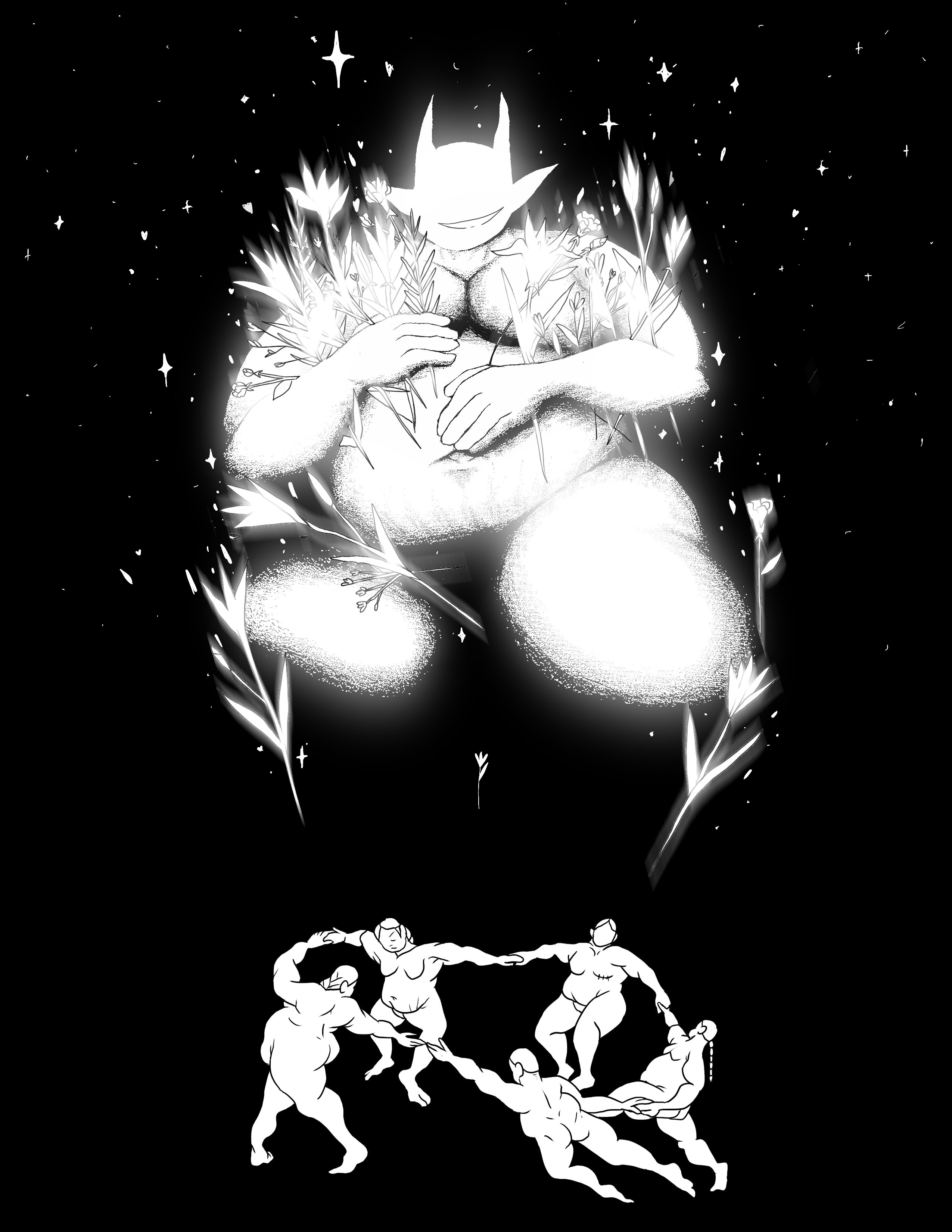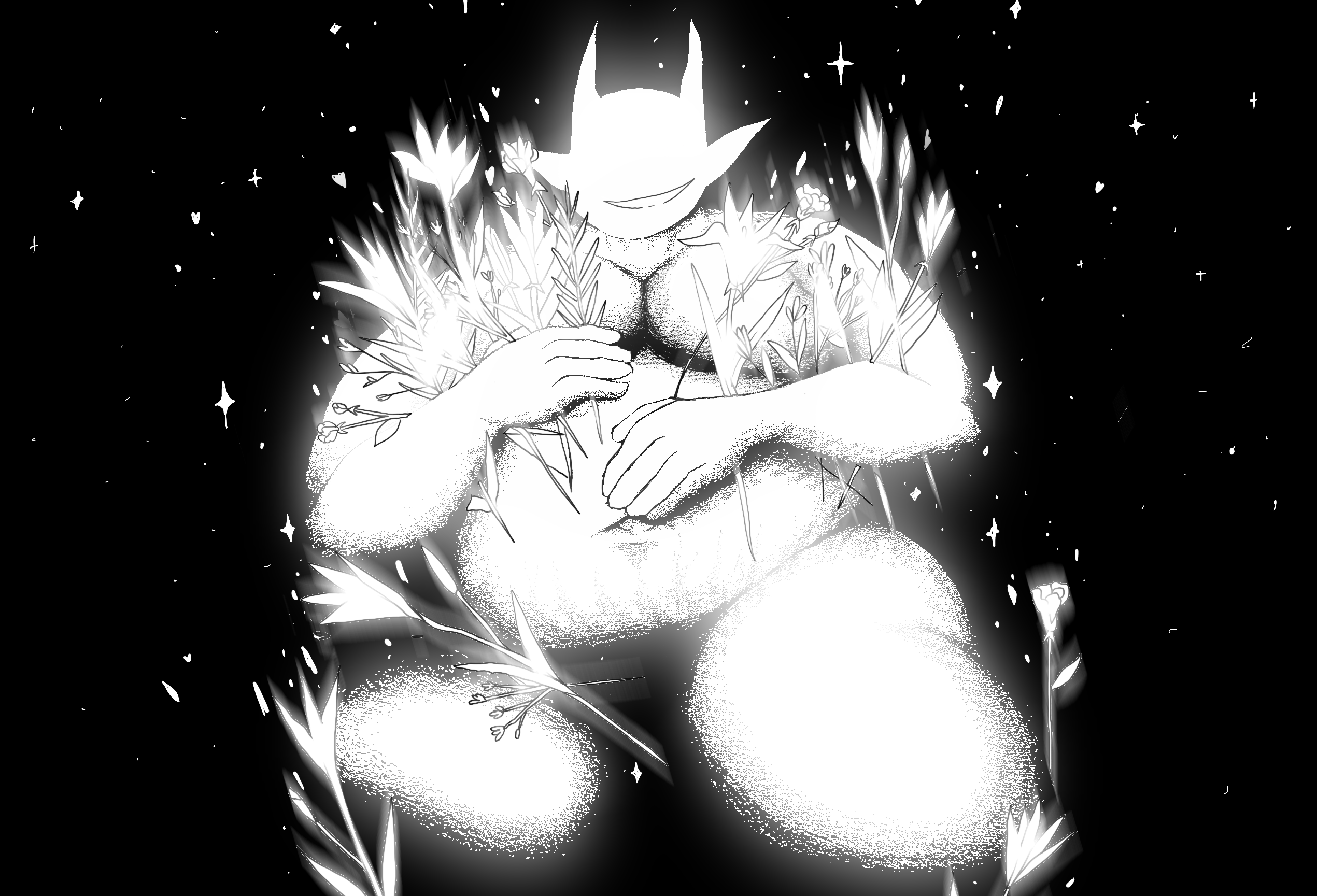Growing up with Guyanese and Trinidadian backgrounds, weight was always a subject of discussion, and rarely in a neutral or positive way. Many of my family members are fat. You’d think that fatness would be normalized but it is in fact the opposite, and the anti-fat attitudes are perpetuated primarily by the women. Patriarchal standards of beauty—which equate desirability to thinness—were adopted into their belief system and thus pushed onto younger female family members. As a Caribbean girl, I was taught that one of the most important things was to be desirable, to men, coming from a heteronormative understanding. I was always fat in my formative years. Comments were often made about how much I was eating, criticizing me if I went back for more food and questioning me if I didn’t. Their unnecessary criticisms were often hidden under the guise of humour, which acted as a shield against any backlash. It would quickly become about the sensitivity of the target rather than the inappropriate comments that were made.
When I was ten years old, I was visiting my paternal grandparents in their home. They had a treadmill and I decided I wanted to run on it. Not for the purpose of losing weight, but just for fun. I did not run for very long, but I was proud of myself nonetheless. After I got off the treadmill, I was immediately made the brunt of the joke by my grandmother, who was fat herself. She insisted on making fun of how I got tired so fast, how I barely burnt any calories, and how I would have been better off not running at all. My uncle and grandmother laughed as if she was telling the funniest jokes they had ever heard. As the jokes were ongoing, I sat there in silence, and an older cousin came over to visit. He brought cookies for everyone. He was informed of the jokes at my expense, to which he began laughing along. He then offered me a cookie, and as I was about to answer, he and my grandmother proceeded to make jokes similar to previous ones—but added ones that implied eating like that was the reason for how unhealthy I was, the reason for my fatness. With tears in my eyes, I got up, went into a separate room, shut the door, and looked in the mirror at my body. For the first time in my life, I was disgusted with what I saw and began to silently sob. As I cried, I could still hear my family members making “jokes” and laughing at my expense. This incident was the trigger for years of disordered eating.
I felt responsible for unpacking this incident and the pain it caused. I began to research where their attitudes originated from, and while my family’s actions were and still are inexcusable and inappropriate, I began to understand the causes of their thought process and harmful words.
In Renaissance artworks by painters Albrecht Dürer and Peter Paul Rubens, white women were painted fat and beautiful while Black women were painted as thin and sickly, emphasizing that white women were the standard, and desired, whereas Black women were the exact opposite.
Fatphobia Is Anti-Blackness
In the sixteenth century, prior to the height of the slave trade, white Venuses were prized. That meant white fat women and their plumpness were the standard of beauty and white men’s preference. In Renaissance artworks from this period by painters Albrecht Dürer and Peter Paul Rubens, white women were painted fat and beautiful while Black women were painted as thin and sickly, emphasizing that white women were the standard, and desired, whereas Black women were the exact opposite. The enslavement of Africans leading to their forced displacement across Europe, the Americas, and the Caribbean created the need to further differentiate whiteness from Blackness. In the seventeeth century, white scholars began to demonize Black skin, but also relied heavily on equating fatness with Black femininity as excessive and inferior despite fatness being the very thing that was the definition of beauty at the time. Once white scholars realized that a lot of the enslaved Africans possessed the traits they deemed to be the epitome of beauty, they began to link fat Blackness to animalistic traits, stating that Africans lacked the intellectual or moral capacity for rational self-discipline and this resulted in them indulging in vices of the flesh, food, and fornication. Saartjie “Sarah” Baartman is a historical example of how these ideologies impacted Black women first-hand.
How Fatphobia Got Me
After educating myself on how fatness became demonized, I began to be comfortable with and love all aspects of my fat body. My heaviest coincided with the peak of my confidence. I was going to wear what I wanted, go where I wanted, and eat what I wanted simply because I wanted to. I was going to take up space, and not care what others had to say. I was not going to allow anyone to shame me or make me feel ashamed ever again because of my body after the horrific history I had learned.
After the pandemic hit, my anxiety skyrocketed, and when medication was no longer working for me, I began to work out, never with the intention of losing weight as I was fully in love with my fat body. However, I did end up losing a lot of weight in a short amount of time. My new figure was praised left and right, and this conjured up regular thoughts about how I should be more confident, and more desirable now that I was smaller. I felt somewhat proud that I was no longer fat and that others noticed my weight loss. I quickly came to realize I missed my fat body more than ever, and that my internalized anti-fatness had not been fully unpacked the way I thought it was. I knew about the history, but was still unclear on how it related to my specific experience as a Black Caribbean woman, and that was needed to address the remaining anti-fatness within myself.

Caribbean Context
Sugar plantation owners were some of the wealthiest folks in North and South America. Prior to that, sugar was a rare delicacy reserved for the fanciest and richest people in Europe. Sugar had to be imported from the Caribbean primarily as it had to be harvested in the tropical climate the region provided. By the nineteenth century, sugar use was spreading, and folks realized that there was a lot of money to be made in the Caribbean if sugar could be produced at a cheaper rate using slave labour. Trinidad and Guyana were well known for sugar cane plantations and had slaves brought there specifically for sugar harvesting. Post-slavery, after abolition, sugar was looked down upon and associated with disease and death. Once sugar became one of the largest profitable exports for freed Black folks across the Caribbean, it was demonized. Caribbean people are now characterized as having an obesity and diabetes problem, both of which “experts” say are linked to eating in excess, or gluttony, and high consumption of sugar. These same things were said about Black women in the seventeenth century when it was first made clear that fat Black people were not the beauty standard. When learning this specific cultural significance, everything made sense.
The way my family—and other Black Caribbean families—talked about and interacted with fatness was ingrained in us for hundreds of years, not just through socialization but also through abuses experienced via enslavement. It is not that fatness is inherently bad or unhealthy; it has just been historically negatively associated with Blackness due to racism, and so it is demonized for that reason and that reason alone.
While I have made attempts to share my knowledge and understanding with my elders who forced these harmful ideals onto me—typically in moments when they are spewing anti-fat rhetoric about their bodies or someone else’s—they have been resistant and refuse to even consider what I have to say. They are very much comfortable and complacent in their socialization, and while that doesn’t discourage me from disputing their harmful notions, I go into those situations with adequate expectations. I now make an effort to share my knowledge with family members younger than me to not only try to educate them on the subject, but to prevent them from encountering the unnecessary pains and trauma I experienced growing up.
How to Get Revenge on Fatphobia
The ultimate revenge would be to dismantle the systems that support and uphold fatphobia. In Da’Shaun L. Harrison’s book Belly of the Beast: The Politics of Anti-Fatness as Anti-Blackness, they state that regardless of how much internal work one does on themselves, the systems under which they live cannot be reversed through any introspection or outward expression of radical self-love. They go on to say that anti-fatness must be pulled up at the roots, and the social institutions through which we are initially socialized have to be destroyed. If we love ourselves and the people around us, we must also be committed to destroying the world in which we are actively harmed. Self-love and encouraging fat people to love themselves will not make things easier. It doesn’t genuinely change anything when the systems actively oppressing fat folks exist whether self-love is present or void in the equation.
You have to decolonize the way you conceptualize fatness, health, and determinants of health. You have to realize that the way we are socialized to think about fatness was created to keep Black people on the outskirts of desirability.
Until the systems themselves come down, getting revenge should look like the removal of fatphobic language and ideals from your everyday life, and holding those around you to the same standard. The first step in getting revenge on anti-fatness is to truly educate yourself on the origins of anti-fatness and its roots in anti-Blackness. You have to decolonize the way you conceptualize fatness, health, and determinants of health. You have to realize that the way we are socialized to think about fatness was created to keep Black people on the outskirts of desirability; it has nothing to do with the reality of fatness and fat people. You must understand that anti-fatness does not exist on its own—it is a form of racial violence rooted in anti-Blackness. As a result, anti-fatness, just like anti-Blackness, is entrenched in every system: from healthcare, to food production and consumption, the beauty industry, and everything in-between.
This decolonization practice looks like self-introspection. Do you put moral value on your food? Do you feel a false sense of superiority when eating a fruit or vegetable versus pizza? Do you mentally berate and belittle yourself when you eat food that is deemed to be “unhealthy”? Do you feel bad when eating carbs and tell yourself you’re going to have to work it off later? Do you find yourself judging others for simply existing when they are fat? Do you fear being fat because you equate fat with being unhealthy, and ultimately see fatness as a bad thing?
Next, it would be wise to re-evaluate and analyze the way you think and speak about your own body, as well as the way you think and speak about others. Do you find yourself demonizing your body when you wear clothes that you have been socialized to see as unflattering? Do you equate your self-worth with the number you see on the scale? Do you think when you eat something you deem to be unhealthy that you have to work out to “burn” off the calories? Do you talk about how you need to lose weight? Do you unnecessarily compare your body to others you see on social media? Do you find relief in the realization that others are fatter than you?
After self-reflection, it is time to turn your knowledge and understanding into practice. This may look like supporting fat-positive brands, not ones who falsely preach inclusivity, but ones who prioritize having an inclusive size range and have just as many fat Black people in their ads as they do thin white folks. You should make a consistent effort to uplift fat folks’ work, fat Black folks who are often pushed out of fat-inclusive spaces and conversations. We are all taught growing up to hate fatness whether we realize it or not. Educating yourself and working against anti-fatness is a lifelong commitment, one that we should all undertake. The true revenge is going against everything you have been taught to believe about fatness and health.
You know better, so what steps are you willing to take to be better?












